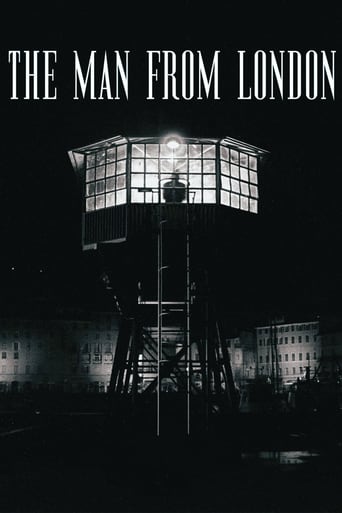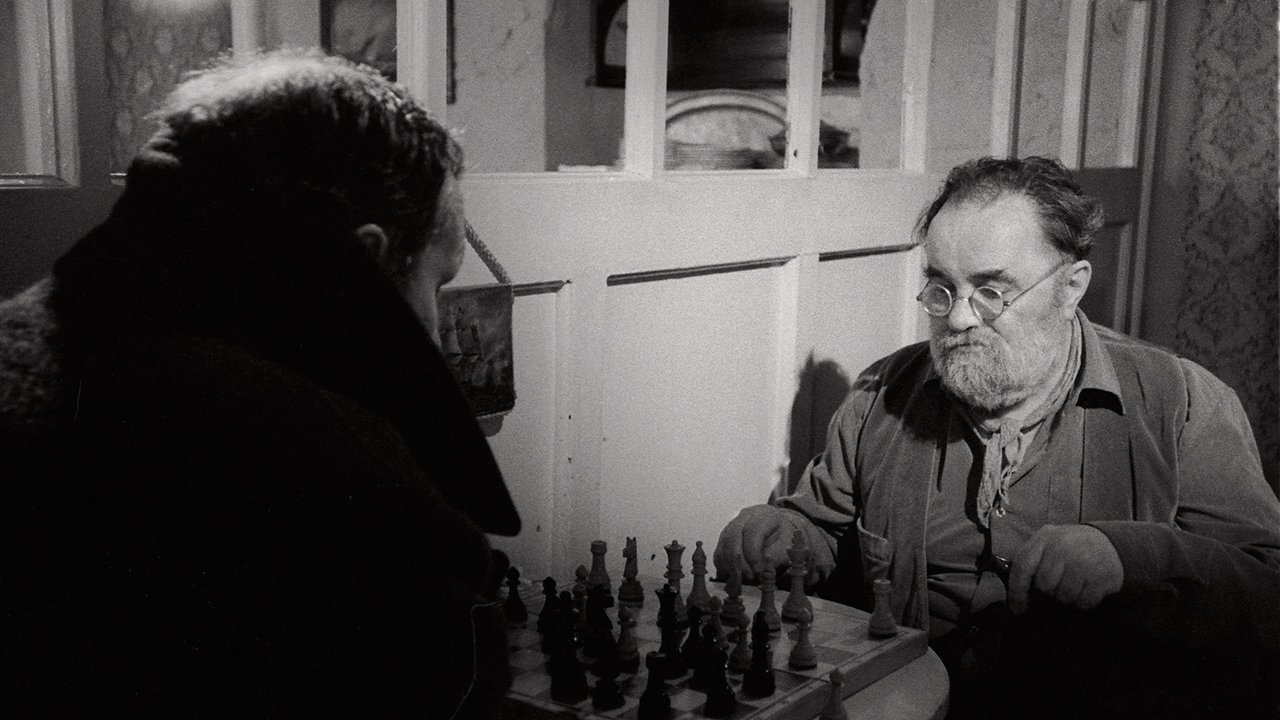Tauren Humnus
This is a great film to watch if you have a short amount of time to live. You will feel like you've been watching for an eternity!! OK that's not entirely accurate. You may also enjoy it if you need help sleeping. The film opens with a beautiful shot of a seaside railway and takes the next 8 minutes showing zZZzZzZzZzzzZzZz. I loved the artsy vibe this film has but the long drawn out shots get old very fast. If you're a fan of things happening in movies, then you probably won't like this one. I appreciate the artistry of the film but that doesn't mean anything actually happens in it. After 34 minutes there weren't more than 10 to 15 lines of dialogue. I give this film an A+ if it was going for a pretentious coffee house artsy hipster vibe. Who knows, this might be right up your alley, it just wasn't for me.
tieman64
"All stories have resolved themselves. All that remains is time." - Bela TarrBela Tarr directs "The Man From London." The plot? Maloin is a grim-faced railroad employee. He sits in a signal cage all night, pulling giant levers which cause rail tracks and train signals to alternate. In other words, he makes choices for a living. These choices, of course, have ramifications; they literally "change the course of things".One day Maloin witnesses a murder, a small briefcase being lost in the scuffle. He retrieves this briefcase and opens it up to find six thousand dollars in stolen cash. Maloin faces a moral dilemma. Does he keep the money or does he return it to the authorities? It's a familiar, noirish plot, but Tarr handles the material in his own inimitable way. This is a world of infinite seas and lustrous blacks, the film's characters rarely speaking, Tarr's camera observing them all with agonisingly slow long takes. Many have complained that the film is "boring" and "listless", but these are characters who have long accepted a kind of slow and inevitable deterioration. They've chosen to live in complete isolation, succumbing to a kind of existential dead-lock; no amount of action will halt death, so they stew in their own private miseries.And so the antagonist of this film is time itself. Time is a monster, Tarr says in interviews, his Hungarian drawl like a discordant piano. Time sucks and draws blood, reducing its players to mechanical ghouls, alienated and resigned to fate.But of course Maloin sees a way out. This little briefcase of money could bring him happiness, couldn't it? The film thus becomes a sort of religious parable, the temptations of a new life seducing Maloin. Does he reject the money and embrace a kind of ontological damnation or does he embrace the money and hope for some brief respite? If you've seen Tarr's other films, you know the answer.Elsewhere the film uses the tropes of noir – high contrast lighting, men in coats, a crime, a moral dilemma, a prowling police inspector, cold urban spaces etc – but Tarr has flattened these signifiers and placed them within a world that is comprised of four clearly demarcated planes.There's the domestic space (the home in which we eat/sleep/defecate), the space of entertainment or amusement (the bar, where our hero plays chess, gets drunk etc), the space of labour (the railroad and harbour) and beyond (the infinite ocean). The first 3 spaces sit next to the ocean. They teeter fearfully beside this limitless mass of black, always threatening to fall in. The ocean - thick, black and inky - is the final plane. A plane of murder and perhaps spiritual and physical death.Indeed, water has such a strong impression on the inhabitants of this world that when Maloin sees his daughter sweeping water out of a shop - pushing back time - he immediately resolves to make her happy, forcing her to quit her job and buying her a fancy new coat. But of course it's no use. These are empty purchases, idyllic gestures which Maloin doesn't believe in anyway; he believes solely so that she may temporarily hope, the reverse of the characters in Tarr's "Damnation", who cut down the beliefs and hopes of others so that everyone might partake in a kind of communal misery. Significantly, when Maloin argues with his wife over the purchase, Tarr's instinct is to cut to the little girl mechanically eating a bowl of soup. Spoon after spoon she swallows...spoon...after...spoon...8/10 – Tarr seems to be repeating himself here, and aesthetically the film's not as strong as his best work. For those who find the film ponderously slow, watch it at x2 speed. Worth two viewings.
robert-temple-1
This film has many extraordinarily interesting qualities, but they are all ruined by the apparent vanity of the director, who appears to be a kind of inverted snob (I watched the interview of him on the DVD). The first shot of the film lasts about five minutes, maybe more, and is interminably boring, moving at slower than a snail's pace. But the director, a Hungarian named Bela Tarr, is determined that we must watch it, perhaps on the theory that anyone lacking the patience to do so is one of the unworthy ones, and does not deserve to see the rest of what he considers his masterpiece. The film defies all normal expectations of a viewing public and does not appear to be made for audiences at all, but rather an example of the director making something to please himself and his two or three best friends. The film is in black and white, and the cinematography is spectacularly good. Tarr gives the impression that he wishes to evoke the same moods as the famous night photos of Paris by Brassai. The film is based upon a novel by Georges Simenon, and the dialogue is in a mixture of French and English, with no Hungarian spoken, as all the Hungarian actors are dubbed in either French or English. It is supposedly set in a French port which has a ferry whose passengers disembark onto a waiting train. We often see them doing this at night, heads bowed, like passengers entering the Afterlife, carrying small valises to last them for Eternity. The film is based so entirely upon images that, if not for its sluggishness, it would qualify as Imagiste in the tradition of Ezra Pound and Hilda Doolittle ('H.D.'). In his interview, the Director says it is not necessary to hear the dialogue or read the subtitles, as the images speak for themselves. Tarr appears to be inspired by the films of Carl Dreyer, and wishes to sear our sight with ravaged faces, upon which the camera lingers for whole minutes, in the hope that souls will emerge from the eyes and the skin, with the characters' inner depths spilling out like guts on the battlefield. Long, sombre shots where nothing happens are suddenly interspersed with explosions of intense and violent human emotions. Characters who had seemed dead have their electricity turned on and suddenly start shouting and gesticulating. In this melée the chamaeleon-like Tilda Swinton (who is always likely to turn up in the most bizarre settings, and the stranger it is, the more certain we can be that she will be there) has a cameo part, which may have required one or two days's shooting time (or should I say weeks, at Tarr's pace?) Once again, she startles us with her brilliance. Making good use of her fluent French, she plays a desperate, shrieking, terrified harridan of a wife to a man who never speaks and has no money, played by a taciturn Miroslav Krobot, with knitted brow and lips stuck together with glue. The weird music by Mihaly Vig is hauntingly effective, drawing upon its sheer monotony to create a captivating and eerie atmosphere which matches the film to perfection. A girl named Erika Bok plays the daughter of Swinton and Krobot, and is utterly fascinating in her slack-jawed ugliness and simulated stupidity, so that one cannot take one's eyes off her. All of the characters are like figures from a dream, none seems real. Surely these are the people who come to haunt one at night when one has had too much fois gras and sauterne. Can people like Tilda Swinton even exist? I have in other reviews pointed out that she is an extraterrestrial at least, if not someone from another dimension. As for Erika Bok, she cannot possibly exist, she has to be invented. The ultra-weird Istvan Lenart, speaking with the dubbed voice of Edward Fox sounding like a séance-voice of a disembodied spirit reciting the Creed at a black mass, or a corpse enunciating its views from its crypt, outdoes even Swinton in non-human appearance, in the competition to appear unreal and trans-human. He has more folds and wrinkles to his face than a rhinoceros, and has the eyes of a dead man who has lain in his grave for at least twenty years without rotting down properly. This film is like a film full of nocturnal zombies, but the film itself is also like a zombie, since it is clearly just as asleep as a ward full of sedated patients in a lunatic asylum, who have all just had electric shock treatment and forgotten who they are before passing out of consciousness. If Tarr were not so vain, and had been willing to make this film watchable, it could have been an astounding classic. But he is even more irritating than the French director Jacques Rivette, whose 'La Belle Noiseuse' (1991) I had previously believed to be the Number One Most Boring and Interminable Film of All Time. Why does Tarr want to bore us to death and drive us away? Because he is 'above' such things as audiences and viewers? If so, we are so far beneath him that we truly do not deserve him. He should be making films for jungle sloths. What a terrible waste, that a man with such talent should be so perverse in refusing to make 'compromises' that he forgets that films are meant to be seen by people, and not to be kept at home in a locked drawer. 'Vanity, vanity, all is vanity!'
benmarshall-2
...and I NEVER do that at the movies! I saw this at a press screening last night, and all that I can say is anyone who says they enjoyed this film has to either be unbelievably pretentious or just flat-out pretending.An hour in and NOTHING HAPPENED! Without a doubt the most BORING film I have ever seen. I can't believe I lasted that long without falling asleep, although I did feel my eyes getting frequently heavy. It also had the most terrible dubbing I've seen in ages, it reminded me of that guy from the Police Academy movies with the voice effects! Tilda Swinton was obviously speaking English because he lips matched the subtitles. Why bother to dub iit into FRENCH (err wasn't this supposed to be a Hungarian film?) and then subtitle it in English?Avoid like the plague.


 AD
AD



